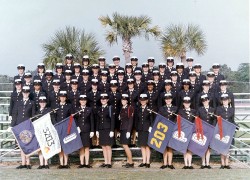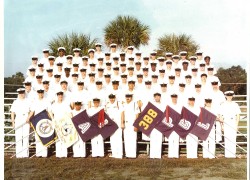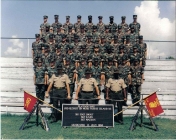Specialty Summary. Performs aircrew duties on numerous airborne platforms. Operates, maintains, repairs, and tests airborne communications, sensor, computer, and electronic systems. Performs preflight, in-flight, and postflight duties. Supervises and instructs personnel in operation, maintenance, repair, and test procedures. Establishes, manages and supervises airborne mission system operation and directs aircrew training. Related DoD Occupational Subgroup: 120100.
Duties and Responsibilities: Inspects and operates airborne communications, sensors, computers, and electronic systems. Plans, organizes, and coordinates mission activities and materials. Determines aircraft status and coordinates link establishment and network connectivity information. Performs preflight, in-flight, and postflight inspections. Performs initial power-on and testing of airborne communications, sensors, computers, and electronic systems. Establishes and maintains voice and data communications circuits/links. Repairs and maintains airborne communications, sensors, computers, and electronic systems. Operates aircraft emergency systems and equipment..
Performs and supervises airborne equipment operations and maintenance. Initializes, operates, monitors, tests, troubleshoots, isolates malfunctions, and repairs radio, audio distribution, switching, data, cryptologic, anti-jam, satellite communications, radar, identification friend or foe, recording and playback, multiplex, electronic warfare (EW), intercept, analysis, recording, broadcasting, imaging, computer, and network equipment (including ancillary equipment). Monitors displays and indicators for equipment status using technical orders and manuals, test equipment, software diagnostics, voltage checks, resistance measurements, waveform observations, or other tests. Installs, operates, and monitors special support systems. Performs aircraft exterior scanner duties. Monitors aircraft engine, propeller, hydraulic, pneumatic and flight controls systems during engine start. Adheres to communication security (COMSEC) procedures
Establishes, supervises, and directs aircrew training. Develops and directs instruction in equipment operation and troubleshooting. Ensures standardized procedures are used to teach in-flight equipment operation, maintenance, and repair. Determines need for specific instruction, and establishes training programs on airborne systems.
Evaluates airborne mission systems operation and maintenance activities. Evaluates compliance with technical manuals, regulations, and work standards. Serves on or directs airborne mission systems inspection teams to evaluate in-flight maintenance and operational programs. Interprets inspection reports and prescribes corrective actions.
Manages operating and maintenance functions. Maintains operational inspection and maintenance records and documents. Reviews unusual and difficult problems in operation and in-flight maintenance of equipment. Recommends methods, techniques, and procedures to enhance maintenance and operational capabilities, and improve mission system options. Advises on mission systems operation and maintenance, and coordinates on research and development projects.
Specialty Qualifications:
Knowledge. .Knowledge is mandatory of: electronics, computer, radio, and radar theory including solid-state components, electronic principles, networking, digital techniques, basic software structure, principles of radio frequency (RF) as applied to basic radar, voice and data communication systems, digital data processing; general purpose computers and interface units; interpreting technical orders, schematics, and wiring diagrams, logic diagrams worldwide communications, direction-finding, multiplex, data and voice procedures capabilities, limitations, operations, and functions of electronic test equipment; binary, octal, and hexadecimal numbering systems, mission systems forms and reports software diagnostic routines; and maintaining airborne weapons systems and ancillary systems
Education. For entry into this specialty, completion of high school with courses in physics, mathematics, and computer principles, mathematics, typing, speech and English is desirable.
Training. The following training is mandatory for the award of the AFSC indicated:: Completion of the Aircrew Fundamentals Course (L3AQR1A311 01AB) is mandatory for pipeline and non-aviation service cross training students. Completion of the Airborne Mission Systems (L3ABR1A331) is mandatory for award of the 3-skill level AFSC.
Experience. The following experience is mandatory for award of the AFSC indicated:
1A351. Qualification in and possession of AFSC 1A331. Also, experience in operating and maintaining airborne communications, test, sensor, computer, and electronic systems.
1A371. Qualification in and possession of AFSC 1A351. Also, experience and qualification in advance operations and maintenance of aircraft mission systems.
1A391. Qualification in and possession of AFSC 1A371. Also, experience managing advanced operations and maintenance of aircraft mission systems.
Other. The following are mandatory as indicated: For entry into this specialty, see attachment 4 for entry requirements. For entry, award, and retention of these AFSCs: Qualification for aviation service according to AFI 11-402, Aviation and Parachutist Service, Aeronautical Ratings and Badges. Physical qualification for aircrew duty according to AFI 48-123, Medical Examinations and Standard, Class III medical standards. Must maintain eligibility to deploy and mobilize worldwide.
For entry, award, and retention of AFSCs 1A311/31/51/71, physical qualification for voice communications operations. For award and retention of AFSCs 1A331/51/71/91/00, eligibility for a Top Secret (TS) security clearance according to AFI 31-501, Personnel Security Program Management. NOTE: Award of the 3-skill level without a final Top Secret (TS) clearance is authorized provided an interim TS security clearance has been granted according to AFI 31-501.




